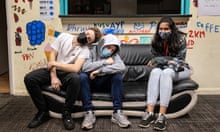What happens to the most vulnerable children when they are not at school? With figures from the National Education Union showing 900,000 pupils absent owing to “Covid incidents”, it’s a question we as a society have a duty to answer, insists Ndidi Okezie, the chief executive of the charity UK Youth.
“When young people are not at school and can’t be at home, it is youth work provision that scoops them up but now that sector is on its knees,” she explains.
A survey of 1,800 youth organisations by UK Youth in November found that 65% were working with fewer young people as a result of Covid-19. “The significance of that stat is chilling,” says Okezie. “This is not work that is nice to have; it is vital.”
The 41-year-old ex-teacher says it was her “dream job” when she became chief executive of UK Youth in January. The charity champions investment in the youth sector and supports 7,000 youth organisations across Britain, and is one of the recipients of the Guardian and Observer’s charity appeal 2020.
Six weeks into the job, Covid-19 hit and Okezie found herself furloughing 65% of her staff and making 25% of them redundant.
The charity’s outdoor learning centre in the New Forest, Avon Tyrrell, had to close – losing UK Youth £2m of income. Okezie recalls: “It was heartbreaking. We didn’t know whether it would be back.” It will be next year.
The charity, which has an annual income of £6m, works with 100,000 young people a year, and was suddenly under threat at the time it was needed most.
“With every single issue that has come out of Covid-19, young people are one of the most impacted groups, be it employment, mental health or digital exclusion,” says Okezie.
School closures have left children and teenagers vulnerable to unsafe home environments, physical abuse, self-harm and drug use.
“We are dealing with generations of young people whose every prior need has been exacerbated by the pandemic and the most vulnerable are hit hardest.
“Youth organisations have been picking up the pieces but the very real concern is the sector has been decimated and as we look towards coming out of the crisis there may not be a sector there in the same way for young people.”
Although the £16.5m in this month’s spending review for a youth Covid-19 support fund is welcome, Okezie says: “It’s not enough and it’s not even going to touch the sides.”
Meanwhile a government pledge of £500m in transformational funding for the youth sector has been delayed because of the pandemic.
Okezie was among those to sign an open letter warning that youth services are on the brink of collapse. They point to new figures which suggest two out of three youth charities will not be able to meet costs by March 2020 and one in four are unable to meet their running costs before Christmas.
UK Youth has funded 265 projects so far this year. By the end of 2020 it will have allocated £3m in micro-grants to grassroots youth organisations. This includes a £2m UK Youth Fund – Covid Relief made up of contributions from the Department for Digital, Culture, Media and Sport, the Pears Foundation and the Paul Hamlyn Foundation, which it distributes to eligible small, local youth organisations.
According to Okezie, more than 1,800 organisations applied for the funding, although it is far short of the £15m these charities and voluntary organisations say they need to survive in research undertaken by UK Youth.
Following the death of George Floyd and the subsequent Black Lives Matter protests this year, Okezie invited staff to talk about their experiences. Out of that conversation came the idea to give young people a platform to share their stories.
“Suddenly there was this huge spotlight on race and UK Youth really leaned into this – it was incredibly emotional and problematic and it was one of those moments where I thought, wait, I can do something, I’ve got agency, I’m the CEO.”
The charity launched the campaign #YoungAndBlack to highlight the experiences of black people in Britain and encourage them to amplify their voices on social media. More than 300 organisations signed up to support the campaign.
At the same time, a report, Home Truths, published in June by Acevo and Voice4Change, found that more than two-thirds of Black, Asian and minority ethnic (BAME) people working in the voluntary sector had experienced, witnessed or heard stories of racism.
The findings, which Okezie described as a “disaster”, led UK Youth and other charities to sign a commitment to dismantling racism within the voluntary sector.
“The report also highlighted the lack of leadership role models when it comes to BAME people,” says Okezie, who is among just 6% of BAME chief executives in the voluntary sector. The percentage of black female leaders is far less.
When she took on this job, she says that she wasn’t prepared for the “tsunami of attention” that came with her appointment.
“People were emotional about the fact there was a black woman CEO in the charity sector in a way I had not expected. It was important to them to have someone in this position that looked like them. Because of that I realise I’m not here only to do the job but to create actual systemic change so I’m not just an outlier.”
Born in Nigeria, the youngest of six children, Okezie came to the UK with her mother as a baby.
“There is no rhyme or reason for me to be here in this position. There is nothing about my life that said I’d be here,” she says. “The fact I am the ‘only’ in many environments I walk into bears an additional weight. I feel I need to make a difference otherwise why take up the seat?”
Her biggest fear is we don’t yet fully understand the long-term impact of Covid-19 on young people. But describing today’s youth as “the lost generation” she finds unhelpful.
“People are using this flippant language but young people haven’t gone anywhere. Where are they and what is happening to them now? We have a responsibility to answer that,” she says.
“We are only just starting to pick up the pieces and to make sure we have a net to catch them with on the other side.”
Curriculum vitae
Age: 41.
Family: Single.
Lives: South-east London.
Education: St Saviour’s and St Olave’s secondary school; Brunel University, London (BSc Hons psychology, children and family); King’s College London (MA education management).
Career: 2020-present: CEO, UK Youth; 2019: vice-president: secondary portfolio UK schools (interim), Pearson; 2018-19: digital and customer voice strategy, Pearson; 2012-18: executive director, Teach First; 2006-13: assistant principal, Burlington Danes academy; 2004-06: head of department, Business Academy Bexley; 2003-2005: trainee teacher, Teach First.
Interests: Photography, NBA basketball, podcasts, books, films, switch-off-your-brain TV.









